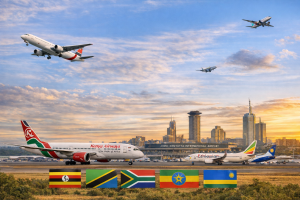Nairobi: On Thursday 27th May 2021, the Kenya Association of Travel Agents (KATA) CEO, Agnes Mucuha led a delegation of Kenya’s travel and tourism industry representatives to a meeting with High Commissioner of Tanzania to Kenya Dr. John Simbachawene at the Tanzania High Commission in Nairobi to discuss strategies for mutual collaboration and partnership with Tanzania in promoting outbound tourism to Tanzania.
This strategic meeting comes at a time when KATA has shifted its focus to promotion of outbound tourism to EAC countries in bid to help its members expand their horizon of business as well as well as improving bilateral ties with the countries to get more tourists to Kenya and simultaneously send tourists from Kenya to those destinations.
This KATA led initiative is part of the association’s strategic role within the African Continental Free Trade Area (AfCFTA) to promote outbound travel and tourism operations within the East African Community (EAC) member states with an intent to develop a model or cross-border tourism.
In March 2018, African leaders signed three separate agreements: the African Continental Free Trade Agreement; the Kigali Declaration; and the Protocol on Free Movement of Persons. The three agreements work with the aim of reducing bureaucracy, harmonising regulations and avoiding protectionism in several sectors including aviation, travel, tourism and hospitality.
The association invited stakeholders from Kenya Association of Tour Operators, East African Tourism Platform, the Global Tourism Resilience and Crisis Management Centre – East Africa and other stakeholders in the hospitality and tourism sector to discuss how to strengthen the trade-in travel and tourism services between the two countries.
The meeting brought to the fore issues that need to be tackled such as the current trade barriers between Kenya and Tanzania that affects travel and tourism industry, handover of tourists at boarder points, increased costs of safaris, work permit challenges for tour drivers, extra fees for vehicle crossing to Tanzania, and limitations of access points into Tanzania. The trade barriers in travel and tourism are predicated upon the 1985 agreement that was signed by both states with a view of creating a platform for the flow of tourists between the two states. The agreement was driven by a market protectionism mind-set that is no longer viable today, and there was failure to adopt the EAC common market protocol that promotes mutual collaboration and cooperation.
Kenya and Tanzania are some of the fastest growing economies in Sub-Saharan Africa with 5.8 percent and 7.2 percent growth rates respectively recorded in 2016. Both countries are richly endowed with natural resources and connected to the sea which makes their position strategic as the gateway to the EAC and Central Africa region.
As President Suluhu of Tanzania noted during her state visit, Kenya is a key partner for Tanzania and is the largest source of African Foreign Direct Investment into Tanzania. However, instead of the two states focusing on cooperation to boost trade and regional growth, they continue to compete on historical rivalry that has seen strong barriers imposed against doing business across the borders despite the countries being signatories to the EAC Common Market Protocol (CMP).
A classic example is when Tanzania banned Kenyan airlines from its space in September 2020, in retaliation to Kenya’s decision to put in place strict travel measures for its citizens over Covid-19 concerns. This move caused a significant disturbance to regional air services that lasted over two months, hampering regional tourism, intra-EAC trade and bilateral trade between Kenya and Tanzania; with the travel and trade sectors advocating for a coordinated approach to the resumption of air services in bid to restore steady business and economic rebound.
This “sibling mistrust” was termed as “both unfortunate and disruptive to travel and trade between the two East African Community (EAC) nations” by the Daily Nation in an article published in September 2020. The paper said that “for EAC to sustain effectiveness, there should be trust and political rapport among participating nations, in addition to having diplomatic processes that sort out routine differences when they arise.”
The KATA led initiative to foster increased outbound tourism to Tanzania is a positive step towards curing the perceived and lingering mistrusts between the two countries.
In the wake of the current global Covid-19 pandemic, there have been calls for African countries to focus on intra-African travel to ensure a quicker post-COVID recovery even as international tourism is experiencing a staggered upturn of the tourism sector.
African tourism ministers, in the recently concluded Global Travel and Tourism Resilience Council (GTTRC) virtual summit, noted that the global pandemic and its effect on tourism was key learning point for the continent.
Speaking during the event, Kenya’s Cabinet secretary for Tourism and Wildlife, Najib Balala said, “I’ve discussed with the African Union Commission on investing in security, air connectivity and seamless accessibility. We need to ensure that Africans can easily travel to their neighboring countries with the correct visas.”
Balala’s sentiments amplifies KATA’s initiative in promoting intra-African travel starting with the EAC. In a first of such bilateral travel promotion, KATA signed a partnership with the Rwanda Development Board (RDB), Rwanda Chamber of Tourism (RCT), the East African Tourism Platform (EATP) and RwandAir (WB) that will see promotion of free flow of business and leisure travel between Rwanda and Kenya. The association is currently planning familiarization trips for its members with talks going on with its Rwanda partners.
KATA is also working on a similar initiative with Ethiopian Holidays, a division of Ethiopian Airlines to facilitate and enhance the promotion of tourism opportunities for Kenya’s travel agents in Ethiopia which will later be followed by FAM trips to Addis Ababa and other attractions within Ethiopia.
In a nutshell
The travel and tourism industry has emerged as one of the largest and fastest growing economic sectors globally. The growth in the Kenyan travel and tourism industry has, in the past, been driven by a combination of rising income levels and changing lifestyles, development of diverse tourism offerings, and policy and regulatory support by the government authorities.
With more than 177 million inhabitants and GDP growth estimated at 5.9 percent, the EAC offers enormous potential for future growth in outbound travel. Whether it is for a business event or just for leisure, East Africans are increasingly travelling regionally for holiday/ leisure, business and MICE tourism.
Over the past year, this growth has severely been stunted by the Covid-19 pandemic across all segments of tourism. The sluggish economy has had an adverse impact on the Kenyan outbound tourism market despite Kenya being one of the fastest-growing outbound travel markets in East Africa.
KATA will continue focusing concerted efforts in the promotion of regional travel as a means to aid the recovery of the travel industry in the post pandemic period and in the spirit of AfCFTA.






